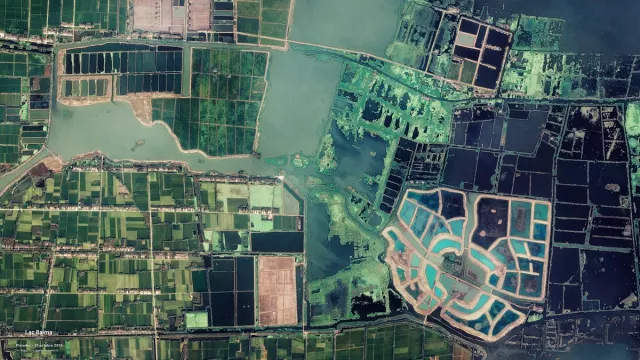We are keenly aware of our responsibility and duty as a government agency to set an example, and we are committed to ensuring the well-being of our people and to preserving living ecosystems.
Our corporate social responsibility (CSR) policy covers the three social, economic and environmental pillars of sustainable development, aligned with France’s CSR roadmap and the UN Sustainable Development Goals (SDGs).
CNES is working to promote space as a tool for gaining new insights into environmental phenomena, nature conservation, efforts to combat climate change and for the sustainable use of outer space.
CNES intends to play its part in meeting the government's ecological transition commitments. Charting a future path to sustainable space with our stakeholders and ecosystem, keeping people and the planet in mind, is the greatest ambition there is for a government agency like ours.
- Chief Sustainable Development Officer

CSR documents
CNES CSR documents:
- CSR policy
- ISO 14001 certificate
- Low-carbon strategy
- Gender equality plan
- SPASER - Socially and environmentally responsible purchasing plan
- CSG biodiversity management plan
- CNES annual report (pages 50 to 59)
CSR documents with partners:
- Statement for a responsable space sector (to which CNES is a signatory)
- Commitment statement by 16 French bodies (including CNES)
Our five CSR commitments
CNES has defined five key CSR challenges in partnership with its stakeholders.
Corporate social responsibility (CSR) is integral to our human resources vision, underpinned by rich and constructive labour relations that seek to encourage diversity, gender equality and well-being at work.
Our HR processes guide the agency's actions and embody our values and commitment in this area, and the desire to promote our employees’ individual and collective sense of fulfilment at work. This is reflected in our increasingly inclusive processes for hiring and onboarding new employees, career-long training to develop skills and offer new horizons, and flexibility to ensure a good work-life balance.
Through our outreach actions aimed at the lay public, we are also using space as a lever for education and to promote STEM careers.
Lastly, CNES is committed to assuring exemplary governance through good labour relations, trusting relationships with our suppliers, full compliance with rules governing professional conduct and ethics, and transparency with regard to the agency’s independent auditing and assessment bodies.
CNES ensures the safety and sustainability of space operations. As such, we are committed to guaranteeing the safe conduct of space and balloon operations likely to pose a risk to people, property, public health and the environment.
We are a prime mover behind European initiatives in the domain of space traffic management (STM), focusing on two areas:
- Regulations and standardization, for which we provide a pragmatic, graduated technical and operational framework to put the European ecosystem in a strong competitive position; we are also tasked with checking compliance of launch and satellite operations with the French Space Operations Act (FSOA).
- Capabilities and operations, to consolidate France’s position in the European space surveillance and tracking consortium (EU-SST) through development of a national ground infrastructure and information system to support effective conjunction assessment and space debris mitigation services.
We are helping to prevent conflict situations by supplying space and processing systems to meet the government and the military’s surveillance, intelligence and deterrence needs.
We are developing space infrastructures to measure climate variables, further the applications of science missions here on Earth and observe the planet.
Lastly, our commitment to maintaining independent access to space—through new launchers and Europe’s spaceport in Kourou—is crucial to continue developing services for populations and scientific research.
CNES contributes to the space sector’s economic influence and performance, and supports scientific research with a view to furthering sustainability, resilience and sovereignty.
Our agency is a key cog supporting the government’s industrial policy and fostering innovation.
To this end, we are leveraging an ecosystem of companies and start-ups to develop and operate a broad range of space programmes through major national investment plans we are tasked with implementing and through international partnerships.
Our research and foresight approach is also fostering innovation and creativity to preserve the sustainability of space activities in line with what the planet can support. We are working across the space sector to help reduce its environmental—and notably carbon—footprint by providing tools, sharing experience and nurturing innovation.
For several decades now, numerous space missions have advanced our knowledge in many fields of science. CNES, academia and industry are constantly striving to supply increasingly effective operational tools that are helping to meet the scientific challenges of both public and private institutions.
CNES is working diligently towards national and European sustainable development goals, pursuing a pro-active approach to reaching net-zero emissions by 2050, and is focused on preserving biodiversity and curbing its environmental footprint for a sustainable planet.
To reduce the environmental impact of our projects, operations and field centres, we are developing ambitious and targeted sector-specific actions in 11 priority areas: sustainable procurement, food, decarbonization and energy, buildings and infrastructures, biodiversity, responsible communication, waste and the circular economy, preservation of water resources, mobility, digital technologies and space projects.
As our footprint is closely tied to that of our partners and ecosystem, we are seeking to make a difference throughout the value chain in the conduct of our projects and operations. We are developing tools—purchasing matrices, greenhouse gas emission trackers, life-cycle analysis tools and so on—with our stakeholders to mitigate our impacts, and sharing them where useful.
At our field centres, we are organizing energy-saving measures and making the transition to renewable energies through ambitious infrastructure construction and refurbishment programmes.
Keenly aware of the effects of increasingly rapid biodiversity loss and the current threats hanging over all natural ecosystems, our agency is engaging a pro-active policy to preserve the exceptional heritage of which we are the stewards in French Guiana. As part of our Act4Nature accreditation and commitment to nature conservation, we are putting in place plans to manage biodiversity at the Toulouse (CST) and Guiana (CSG) Space Centres, working to meet the goal of zero land take at the CST and CSG, to support postgraduate research and innovation and R&T actions focused on biodiversity, to develop downstream applications (notably the Space for Climate Observatory and Connect by CNES), to train our employees and to pursue outreach actions for the wider public, younger generations, students and educators.
We are mobilizing our expertise and close ties with research bodies to help territories, regions and cities cope with the challenges of a changing climate and respond to natural disasters.
At CNES, we have made climate science one of our operational priorities to support regional resilience through the establishment of the Space for Climate Observatory (SCO) and Connect by CNES downstream applications, the development of missions dedicated to hydrology, methane, CO2 and the atmosphere, and through our contribution to securing the long-term future of the Copernicus programme. Within this framework, we are helping to advance knowledge, generate data and adapt territories to serve research scientists and both public and private players.
Through our renowned Earth-observation missions and expertise, we have made France a key player supporting regions around the globe, both for one-off natural disaster management actions and providing decision-support tools for the scientific community to mitigate extreme events.
We are supporting national civil protection teams to enable space capabilities to contribute more easily to home security and rescue missions. As an SAR Galileo service centre and for Cospas-Sarsat, we are notably developing and operating new space-based services.
Lastly, we are also using satellite telecommunications to improve access to healthcare and to deliver the same standard of healthcare to all.





